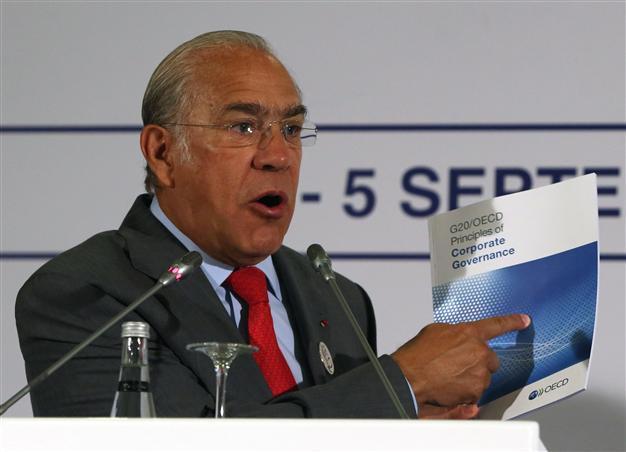OECD cuts global growth outlook for 2015, 2016
PARIS - Agence France-Presse

OECD Secretary-General Angel Gurria. AP Photo
The OECD cut its world economic growth forecasts for 2015 and 2016 on Sept. 16, warning of a dramatic slowdown in Brazil and a global outlook clouded by uncertainty over China.
The policy analysis club of 34 advanced economies had already slashed its economic forecasts just three months ago because of U.S. weakness.
Now the Organization for Economic Cooperation and Development is returning to its calculations with an axe, citing in part a crisis gripping emerging markets as China’s economic boom, and its voracious appetite for raw materials, slows.
The OECD trimmed its world growth forecast for this year to 3 percent, lopping 0.1 percentage points off its previous estimate made in June.
The group issued its interim economic outlook on the eve of a U.S. Federal Reserve (Fed) decision on whether to lift interest rates for the first time in nine years. Analysts say such a tightening could chill global activity.
The forecast for Brazil took the biggest hit, by far, in the latest OECD report.
Suffering like other emerging economies from a commodity price crash, engulfed in recession and with its debt downgraded by Standard & Poor’s this month to junk bond status, Brazil had its economic outlook for this year downgraded to a 2.8-percent contraction instead of a 0.8-percent contraction.
For the world economy in 2016, the OECD lowered the outlook to growth of 3.6 percent, a reduction of 0.2 percentage points from three months ago.
While the U.S. recovery was now solid, the OECD said the picture worldwide was muddied by “puzzles” in other big economies with erratic Japanese data, the euro area’s recovery lacking some vigor and activity in China difficult to assess.
“This leaves the outlook clouded by important uncertainties,” it said.
One big uncertainty is whether the emerging markets will be hurt by rising world interest rates or a sharper than expected slowdown in China, sparking financial and economic turbulence that could be a “significant drag” on advanced economies,” the OECD said.
The group supported a gradual rise in US interest rates but said the pace will be critical.
